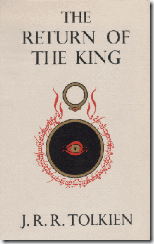 The Return of the King concludes J.R.R. Tolkien's epic trilogy - The Lord of the Rings.
The Return of the King concludes J.R.R. Tolkien's epic trilogy - The Lord of the Rings.
Lord of the Rings is the story of Good versus Evil; of perseverance in the face adversity; of loyalty in the face of temptation; and of friendship. They battle because they must
Frodo and Sam and Gandalf are motivated by what is right and by a chance to save their friends Sauron and his allies are motivated by a desire to rule the world. They battle because of their greed and power lust. Spoiler alert: The good guys win.
Good triumphs because the good people are motivated to protect their lands and help one another.
Sauron motivates his allies through fear and intimidation. As a result, there is no loyalty and constant infighting among his forces.
Of course, the good guys suffer infighting and doubt in the outcome, but they know their cause is just and they know they can depend on their friends and allies. And ultimately, they win because they assist one another voluntarily, despite great risks to themselves.
Return brings the 3-volume story to its climax. Gandalf, Aragorn, and the others remaining from the Fellowship of volume 1 wage war against Sauron's forces, which distracts the evil sorcerer enough to allow Frodo and Sam a chance to sneak into Mordor and destroy the powerful One Ring at the Cracks of Doom, where it was created.
One should only read The Return of the King as part of the trilogy - not only to understand how the story progressed and how we got to where we are; but to appreciate the evolution that so many of the main characters go through. Gandalf is transformed from gray to white surpassing the power of his master Saruman, who was seduced by Sauron. Merry and Pippin begin book 1 as irresponsible children and end volume 3 as heroes. They literally grow up as they both mature and gain height by drinking Ent Water; Aragorn, known only as a wandering woodsman when we first met him, claims the throne through both his heredity and his heroic actions; Frodo, of course, accomplishes his goal of carrying the ring, though it drags on his mind and his body. But it is Samwise Gamgee ("Sam"), whose loyalty and courage makes Frodo's quest happen. He came to us as a gardener and ended up saving the world, doing so with startling humility.
There are so many more characters in this book that captured my imagination: Faramir, who resisted the temptation that doomed his brother Boromir; and his father Denethor, driven mad by the loss of his son and the seeming hopelessness of the War of the Ring; and Eowyn, who disguised herself as a man to join the battle and fulfills a prophecy by defeating a great enemy.
One even finds great characters among the villains, most especially the pathetic Gollom who literally battles with himself over whether to betray Frodo and seize back the precious ring that he once owned.
I could go on and on. There are so many characters and so much texture to the world Tolkien creates, that this series bears reading multiple times. This was my second time, although my first was decades ago.
If there is any weakness of Return, it is that the story continues for so long after the war has settled. After dealing with the one ring and ending the war, the Hobbits return to the Shire to discover it has been ravaged by orcs and bad hobbits under the influence of the evil wizard Saruman. It's an interesting story, but a bit of an anti-climax after the long quest to save the world. Still, it does show the strength gained by which our heroic hobbits, who are able to save the Shire without the help of Gandalf or the elves.
But this does not diminish the book or the series, which stands as a classic of high fantasy. If Tolkien did not create this genre, he certainly defined it. You can see his influence in many who came after him. Terry Brooks's popular Shannara series borrows many characters and storylines from The Lord of the Rings.
Tolkien's story is epic, his writing is poetic, and his characters are memorable.
I am left with the image of Frodo expressing his affection and appreciation for the extreme loyalty shown by his friend Sam, when their demise seems almost certain:
"I'm glad to be with you, Samwise Gamgee, here at the end of all things."
And I am glad this world had Tolkien to give us the world of Middle Earth.